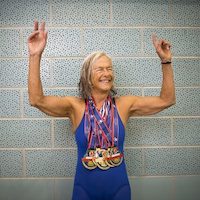Continuing our series on better understanding our older indoor cycling participants, I will address some of the typical psychosocial needs of aging students.
I hope we’d all agree that our goal for our students is not just to improve their quality of health but also to improve their quality of life.
This integrated approach to members is well typified by the YMCA, whose motto talks about serving the mind, body, and spirit. I am happy to work at a YMCA where this is part of the culture, but wherever you teach, you can bring that philosophy to your own class.
When we work together in an indoor cycling class we get benefits for the body, but the mood created can also enrich the mind and lift the spirit. The improved mind and spirit can, in turn, motivate someone to exercise more. My best classes are always the ones where I can tell I not only provided a good physical workout, but something for the mind and spirit as well.
Feeding the mind and spirit can be especially important for older students. Many older students are adjusting to their lives getting smaller. Children may have moved away. Grandchildren may live in another city. Friendships from work may have diminished after retirement. Other friends may be in poor health or maybe they have passed away. Aging does not need to mean loneliness, but it can. The social benefit of indoor cycling is important for everyone but especially for this population.
Let’s examine how you as an indoor cycling coach can enhance the social benefit of indoor cycling for your older riders, and what particular concerns you should be aware of.
Bill Roach, one of our regular ICA contributors, just signed up for Medicare. In addition to his indoor cycle instruction, he is a personal trainer specializing in working with older adults. The Des Moines, Iowa, YMCA Healthy Living Center, where he works, is a unique quasi-medical facility that specializes in using exercise to combat disease conditions. He is certified by the National Academy of Sports Medicine (NASM-CPT) and has speciality certifications as a Corrective Exercise Specialist (NASM-CES), Functional Movement System Professional (FMSC), and as a Senior Fitness Specialist (NASM-SFS).
Other articles in this series:
The Aging Indoor Cyclist, Part 1: Getting to Know Their Needs
The Aging Indoor Cyclist, Part 2: Younger Next Year
The Aging Indoor Cyclist, Part 3: The Psychosocial Aspects of Aging
The Aging Indoor Cyclist, Part 4: The Benefit of Indoor Cycling on the Aging Nervous System


After 18 years as an indoor cycle instructor and working at many gyms, at 72, I retired from coaching/teaching cycle last week. I had fun fun fun!!! I will still go to cycle studios to make sure I never give up that energy (endorphins) I get from a cycle class.
Bill,
Great at series of articles. I also teach at a YMCA, while I have people of all ages participating in my training sessions, in November the vast majority will be over 60. I’m in Florida and we have a large influx of “snow birds” for from November though April.
I find that the seniors are open to different types of music if I explain why the music was chosen. I also find that it is very helpful to tell folks why we are doing each type of training, e.g.high cadence work.
I’m 72 and have been teaching for 10 years and find ICA as the resource for continuing ed.
Keep up the great work.
Loved your 3-part article on the aging indoor cyclist. Was extremely helpful for me. Thank you.
Thanks to you for participating in ICA.